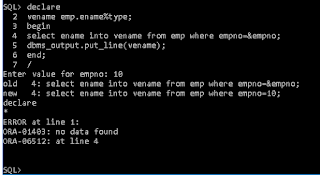Utl_File
Utl_File : This is the Oracle supplied package which is used for extracting data from Oracle queries into csv file or in other format files.
Note:- Before using utl_file package, we need to create a directory in Database. Also need to read and write permission on that directory.
SQL>CREATE DIRECTORY test_dir AS 'c:\'; (For Window OS)
SQL>CREATE DIRECTORY test_dir AS '/tmp'; (For Linux OS)
SQL>CREATE DIRECTORY test_dir AS 'c:\'; (For Window OS)
SQL>CREATE DIRECTORY test_dir AS '/tmp'; (For Linux OS)
Note:-Directory should be created on OS as well.
SQL>grant read,write on directory test_dir to scott;
OPEN a file FOR read operations:-
UTL_FILE.fopen(
file_location IN VARCHAR2,
file_name IN VARCHAR2,
open_mode IN VARCHAR2,
max_linesize IN BINARY_INTEGER DEFAULT NULL)
RETURN file_type;
Example:- Reading line from file and print
DECLARE
vInHandle UTL_FILE.file_type;
vNewLine VARCHAR2(250);
BEGIN
vInHandle := UTL_FILE.fopen('TEST_DIR', 'test_file.txt', 'R');
LOOP
BEGIN
UTL_FILE.get_line(vInHandle, vNewLine);
DBMS_OUTPUT.put_line(vNewLine);
EXCEPTION
WHEN OTHERS THEN
EXIT;
END;
END LOOP;
UTL_FILE.fclose(vInHandle);
END fopen;
/
Open a File in Write Mode:-
UTL_FILE.fopen(
Open a File in Read Mode:-
UTL_FILE.fopen(, file_name, 'r') ;
UTL_FILE.fopen(
Close a File:-
UTL_FILE.fclose(file IN OUT RECORD );
CLOSE ALL FILES:-
PROCEDURE
fclose_all ();
Example:- Writing a line in file
DECLARE
fileHandler UTL_FILE.FILE_TYPE;
BEGIN
fileHandler := UTL_FILE.FOPEN('TEST_DIR', 'test_file.txt', 'W');
UTL_FILE.PUTF(fileHandler, 'Writing TO a file\n');
UTL_FILE.FCLOSE(fileHandler);
EXCEPTION
WHEN utl_file.invalid_path THEN
raise_application_error(-20000, 'ERROR: Invalid PATH FOR file.');
END;
/
declare
fhandle utl_file.file_type;
begin
fhandle := utl_file.fopen('TEST_DIR', 'test_file.txt' , 'w');
utl_file.put(fhandle, 'Hello world!'|| CHR(10));
utl_file.put(fhandle, 'Hello again!');
utl_file.fclose(fhandle);
exception
when others then
dbms_output.put_line('ERROR: ' || SQLCODE || ' - ' || SQLERRM);
raise;
end;
/
Example:- Creating a report from SQL Query
declare
fileID UTL_FILE.FILE_TYPE;
BEGIN
fileID := UTL_FILE.FOPEN ('TEST_DIR', 'emp.csv', 'W');
FOR emprec IN (SELECT * FROM emp)
LOOP
UTL_FILE.PUT (fileID,TO_CHAR (emprec.empno) || ',' ||
emprec.ename || ',' ||TO_CHAR (emprec.deptno)|| CHR(10));
END LOOP;
UTL_FILE.FCLOSE (fileID);
END;
/
Example:- Writing a line in file
DECLARE
fileHandler UTL_FILE.FILE_TYPE;
BEGIN
fileHandler := UTL_FILE.FOPEN('TEST_DIR', 'test_file.txt', 'W');
UTL_FILE.PUTF(fileHandler, 'Writing TO a file\n');
UTL_FILE.FCLOSE(fileHandler);
EXCEPTION
WHEN utl_file.invalid_path THEN
raise_application_error(-20000, 'ERROR: Invalid PATH FOR file.');
END;
/
declare
fhandle utl_file.file_type;
begin
fhandle := utl_file.fopen('TEST_DIR', 'test_file.txt' , 'w');
utl_file.put(fhandle, 'Hello world!'|| CHR(10));
utl_file.put(fhandle, 'Hello again!');
utl_file.fclose(fhandle);
exception
when others then
dbms_output.put_line('ERROR: ' || SQLCODE || ' - ' || SQLERRM);
raise;
end;
/
Example:- Creating a report from SQL Query
declare
fileID UTL_FILE.FILE_TYPE;
BEGIN
fileID := UTL_FILE.FOPEN ('TEST_DIR', 'emp.csv', 'W');
FOR emprec IN (SELECT * FROM emp)
LOOP
UTL_FILE.PUT (fileID,TO_CHAR (emprec.empno) || ',' ||
emprec.ename || ',' ||TO_CHAR (emprec.deptno)|| CHR(10));
END LOOP;
UTL_FILE.FCLOSE (fileID);
END;
/




